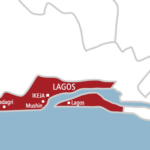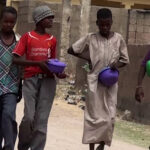Dr Tobi Oluwatola is the Executive Director of the Centre for Journalism Innovation and Development (CJID). In this exclusive interview with Daily Trust on the sidelines of a climate change media training in Lagos, he said Lagos is at the risk of being submerged by flood due to climate change and that Nigeria needs to go to United Nations Climate Change Conference of Parties (COP 27) with a clear plan to be able to get $300 billion grant to build climate resilience around agriculture, coastal infrastructure and to compensate for losses and damages. Excerpts:
The 2022 COP 27 will be held in Africa; what do you think Nigeria should take to the negotiating table?
- NFF presidential aspirant Akinwunmi laments deplorable state of Nigerian football
- 2023 polls: Buhari meets gov, says Nigerians will appreciate APC in 6 months
Nigeria has to go to the negotiating table with clarity on what we require to adapt to climate change; to mitigate future emissions and reduce our current emissions, and also to pay for the losses and damages caused by climate change.
On the adaptation points, I think three sectors are very critical: one sector would be agriculture and making sure that we have food security. Climate change-induced drought and climate change-induced floods and the change in the weather patterns in general are affecting our normal cycles of food production, and that has a cost attached to it in terms of making sure that we have irrigation facilities necessary to make farmers productive, making sure that we have the right seedlings and the right pesticides and other inputs to make sure that our agricultural production comes back to optimum. So, that’s going to be critical and that has a cost attached to it.
The second sector where adaptation is required is our infrastructure. We depend on our water basins for a lot of our electricity. A lot of the Lake Chad is drying up, the Niger is drying up in certain parts.
The last one is somewhat connected to infrastructure and also loss and damage of our ports’ infrastructure. We’ve got to fix our coastal infrastructure, we’ve got to prepare our coast for the worst effects of climate change. Sea levels are rising. Our coasts need to be prepared for the eventualities of that. For example, Lagos is at risk of going under water. We have to build those flood barriers, we have to build infrastructure that will prepare us for that.
To the mitigation point, I think there are a few things. Number one, the energy transition right now is about 70 to 80 per cent of Nigeria’s greenhouse gas emissions from the energy sector. The large part of it is from gas flaring. So, the first thing is that we’ve got to cut gas flaring. That has a cost implication as well in terms of curbing gas flaring. The reason why people flare gas is because they’re trying to get to oil and gas, and if the gas in the wind is commercial, they would be extracting the gas first before you get to the point. But because the gas is not commercial infrastructure, to sell the gas to the markets, they just let the gas cool. So, there needs to be funding to take that gas and to build the infrastructure to basically export or send that gas to the local market. So, a significant funding is required.
There’s also the electricity sector. Nigeria right now generates most of its electricity from a bit of hydro, but gas as well. Gas is our major generating source. We’ve got about 14 solar projects that are grid type projects, but those projects cannot get financing. We need about $1bn to build those particular projects that will put electricity and solar 1.2 gigawatts of solar on our grid. So, financing for these types of projects can come from a process, and they can’t all be loans or equity, some of it will have to be grants. Some of it has to be blended finance, because ultimately, for those projects to also be able to sell electricity or clean electricity to the end consumer, the electricity grid itself needs to be reinforced, and that’s going to cost us about $100bn to enforce.
Then there’s the loss and damage. There are very clear effects and this dovetails into the points I made earlier about adaptation. There are going to be very clear effects and there have been clear losses and damages that have been caused. A lot of times we see the grand effects, but most times we don’t see the micro effects of the losses and damages. That woman in the village who depends on her crops to yield a certain way, but those yields are no longer coming, can no longer feed the family. We need to give some loss and damage compensation to that woman in the village.
What exactly needs to be done on coastal infrastructure?
We’ve got to prevent flooding; for excessive water bodies encroaching on built environment as sea levels rise. So that would include things like coastal barriers that you can build along your coast. We need financing to build proper drainage to prevent and reduce the effects of flooding. And thirdly, we’ve also got to prepare the economies around our coasts.
So, there are the ports infrastructure that we’ve got. There is the fishing infrastructure that we’ve got. We’ve got to protect these things or at the very least relocate them to places where there are less risks of severe weather conditions causing tragedies and disasters.
So, that means conservation of the biodiversity around the coast will build resilience?
Yes, that also is going to be key in building resilience.
Nigeria needs funds to achieve these; so what should be the climate finance plan that will address all of these issues?
The world has to roll back 50 billion metric tonnes every year of emissions; we’re on a path that is going up. We need to be on a sharp downward path. So we’ve got to be very firm and band together with other countries which have not contributed as much to climate change to make sure that these guys live up to their commitments and accelerate the pace of cutting down on their emissions.
Nigeria needs about $300bn to achieve our Nationally Determined Contributions (NDCs). Some of that money, the energy transition plan that is coming up in a few weeks, will tell us a little bit more about some of the clear plans that we have made in terms of our energy transition.
I think that $300bn, some of it is going to go into fixing the electricity grid. Some of it is going to go to each of the things that I had said: electricity grid, building the solution energy generation, clean cooking stoves to replace using of fossil fuels to cook, and some of it will go to loss and damage, afforestation and so on and so forth.
The point is that more than two thirds of that money will need to come as grants because they will not have clear returns on investment. They will not have economic benefits or return on investment. But there is another, close to $100bn, that can be paid back because we also have to remember that climate change is not just a problem. It’s also an opportunity. Energy transition is not just a problem, it’s also an opportunity. It’s an opportunity for us to create the new industries that you know will leapfrog traditional industries that we had before.

 Join Daily Trust WhatsApp Community For Quick Access To News and Happenings Around You.
Join Daily Trust WhatsApp Community For Quick Access To News and Happenings Around You.


